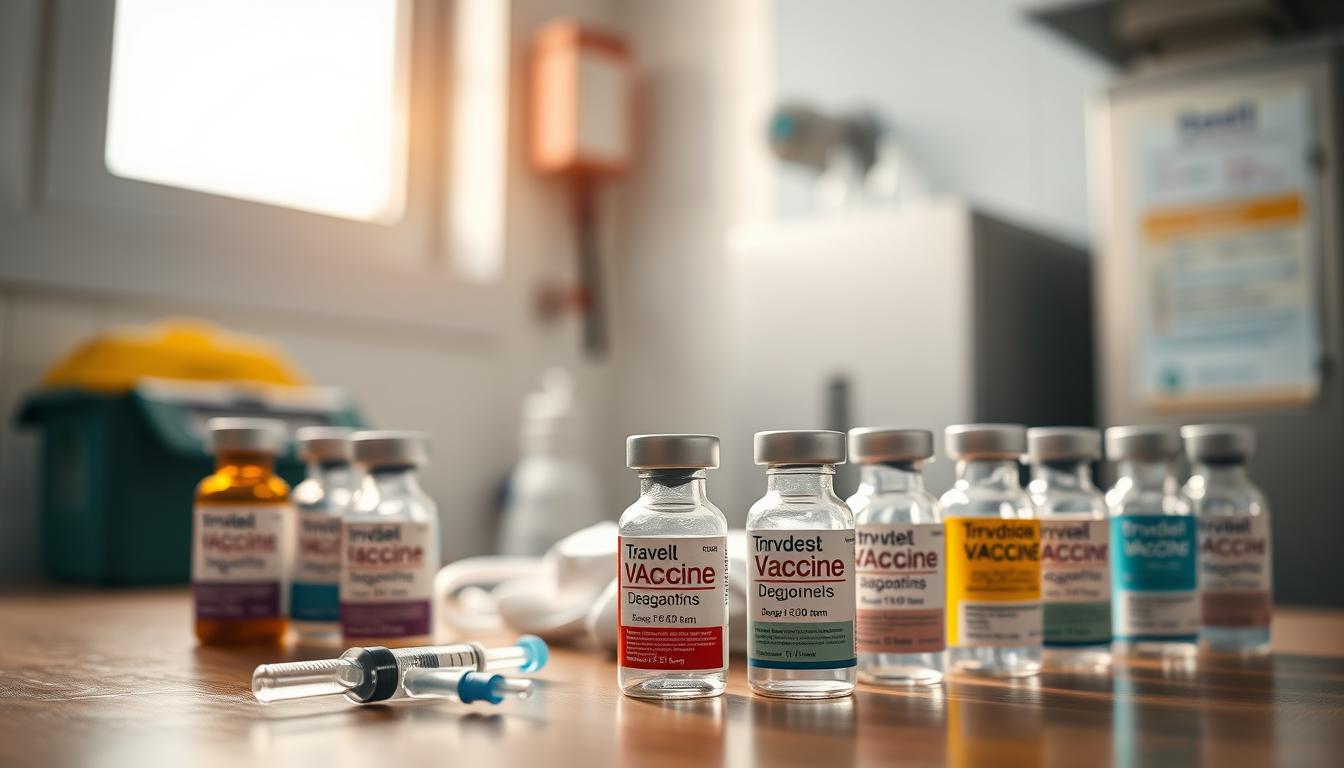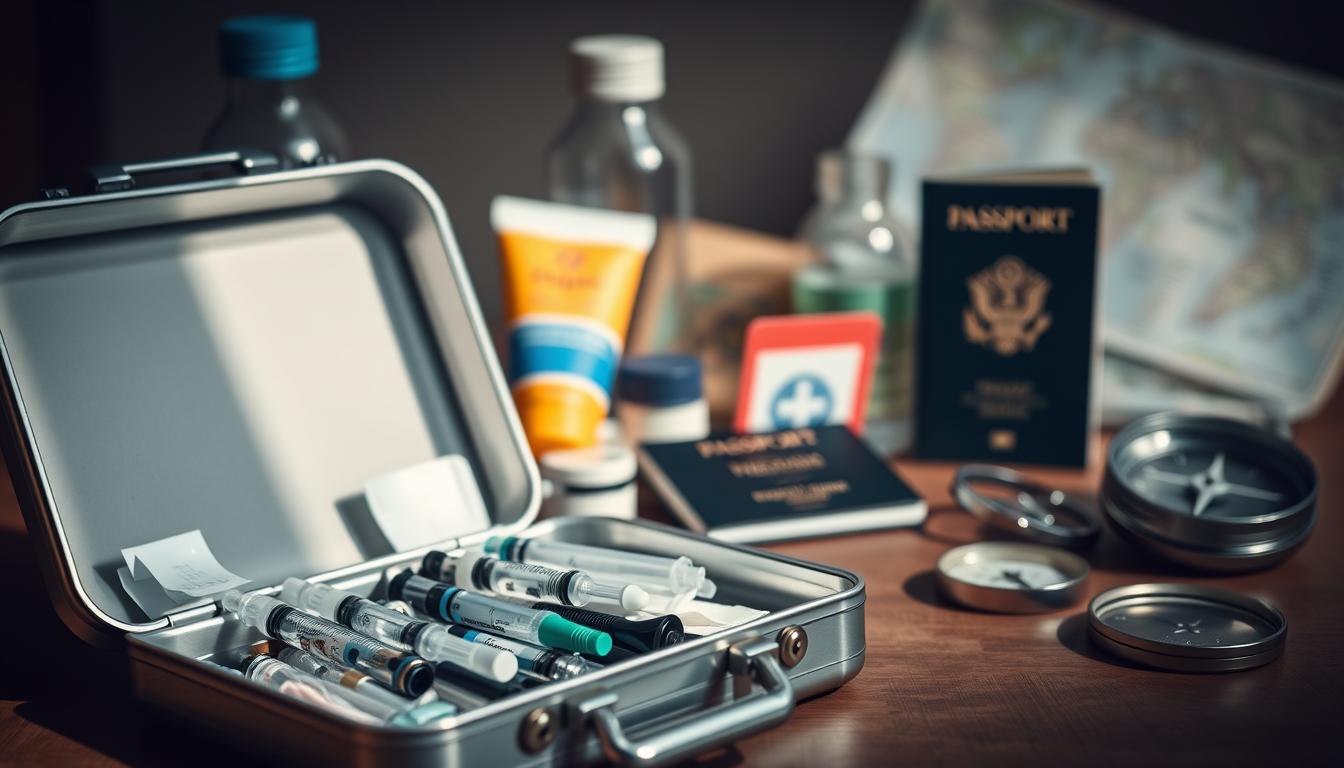Planning an international adventure? Before you pack your bags, there’s one step you can’t skip: protecting your health. Imagine this—a backpacker heading to West Africa spends over $1,000 on pre-trip medical prep. Without proper coverage, unexpected illnesses could lead to even steeper bills. That’s where smart planning comes in.
Many globetrotters face tough choices between staying safe and staying on budget. The Centers for Disease Control recommends region-specific shots like yellow fever for certain destinations. But clinics specializing in travel health often charge premium rates. Did you know primary care providers sometimes offer the same vaccines at lower costs?
Routine immunizations matter too. Staying up-to-date on basics like tetanus or measles builds lifelong defenses while adding extra protection abroad. Pairing these with smart insurance choices helps avoid surprise expenses—like $10,000+ hospital stays for preventable diseases.
Let’s explore how to balance adventure with affordability. You’ll learn practical tips for navigating costs, coverage options, and where to find reliable care. Ready to roam smarter?
Travel Vaccinations: The Basics
Preparing for a trip involves more than packing—it’s about safeguarding your health. Vaccines fall into two categories: those you’ve likely had since childhood and ones tailored to your destination. Let’s break down what you need to know.
Your Health Armor: Routine Immunizations
Childhood shots like measles or tetanus aren’t just for kids. They build defenses that last decades. The Centers for Disease Control stresses keeping these updated—they’re your first line of defense anywhere. Primary care offices often provide these at lower costs than specialty clinics.
Location-Specific Protection
Some regions require extra safeguards. Yellow fever vaccines become mandatory for entry in parts of Africa and South America. Others, like Japanese encephalitis protection, depend on activities like rural hiking. Check requirements 4-6 weeks early—some need multiple doses.
| Vaccine Type | Examples | Best Timing | Typical Cost* |
|---|---|---|---|
| Routine | Tetanus, MMR | Lifelong updates | $0-$50 |
| Destination | Yellow fever, Meningococcal | 4-6 weeks pre-trip | $150-$300 |
*Costs vary by provider and insurance coverage. Public health centers often offer budget-friendly options.
Comprehensive Overview: travel vaccinations and insurance
Many globetrotters discover too late that their coverage excludes critical preventive care. Only 23% of U.S. health plans fully cover region-specific immunizations, leaving travelers to shoulder costs averaging $200-$500 per person.
When Policies Fall Short
Primary care providers often charge 40% less than specialty clinics for hepatitis A/B shots. But insurers might reject claims labeling these as “non-essential.” One hiker saved $380 by getting yellow fever protection through their county health department instead of a private clinic.
| Provider Type | Hepatitis A/B Cost | Yellow Fever Cost | Insurance Coverage |
|---|---|---|---|
| Primary Care | $120-$150 | Not offered | Partial |
| Travel Clinic | $200-$300 | $180-$250 | Rare |
Smart Spending for Safer Trips
The CDC reports hepatitis causes 30% of preventable illnesses in developing countries. Paying $150 upfront beats $3,000+ for emergency treatment abroad. Check your plan’s formulary—some cover typhoid pills if prescribed for high-risk regions.
Prioritize vaccines required for entry, like meningococcal shots for Saudi Arabia. Schedule consultations 6 weeks early to spread costs. Remember: clinics near universities often have sliding-scale fees.
Pre-Travel Health Consultations and Planning
Your dream getaway deserves more than a packed suitcase—it needs a health strategy. Timing matters most when building defenses against region-specific risks. Let’s explore how early prep turns anxiety into confidence.
Scheduling and Timing: The 4-6 Week Advantage
Book appointments 4-6 weeks before departure. Many shots need multiple doses or weeks to build immunity. For example, typhoid pills require completion 1-2 weeks pre-trip. Early planning lets you space out costs and avoid last-minute scrambles.
| Timing | Benefits | Potential Risks |
|---|---|---|
| 4-6 Weeks Early | Full vaccine effectiveness Time for booster doses |
Minimal |
| 2 Weeks Before | Limited options Higher stress |
Partial protection Entry denial risks |
Customizing Your Itinerary for Optimal Health Protection
Share your route details with providers. A jungle trek increases malaria risks, while city tours might prioritize encephalitis prevention. Clinics use CDC data to match precautions to your destinations. Bring past immunization records—they help avoid duplicate shots.
Pro tip: Ask about malaria prophylaxis during consultations. Some regimens start weeks before departure. Pair this with destination-specific advice on food/water safety to slash disease risks. Smart planning today means carefree exploring tomorrow.
Popular Travel Vaccines and Their Importance
Your journey begins long before takeoff—it starts with building invisible shields against hidden health risks. Some immunizations unlock borders, while others guard against region-specific threats. Let’s unpack the essentials every explorer should consider.

Entry Requirements: Non-Negotiable Protections
Yellow fever shots become mandatory when visiting countries like Ghana or Brazil. Without proof, you might face quarantine or denied entry. Saudi Arabia requires meningococcal vaccines for Hajj pilgrims—a rule enforced since 2002 outbreaks.
| Vaccine | Prevention Cost | Treatment Cost* | Immunity Duration |
|---|---|---|---|
| Yellow Fever | $150-$250 | $5,000+ | Lifelong |
| Meningococcal | $120-$180 | $15,000+ | 5 years |
Extra Defenses for Unique Risks
Hepatitis A/B safeguards are vital where sanitation standards vary. Typhoid pills cost $70-$100 but prevent weeks of digestive distress. Rabies pre-exposure series (3 doses) make sense for remote adventurers interacting with wildlife.
Most shots need 2-4 weeks to reach full strength. Schedule hepatitis B 6 months early for its 3-dose regimen. Compare this to $3,000+ for emergency care if exposed—smart timing saves both cash and stress.
These steps do more than dodge diseases. They let you savor street food in Vietnam or hike Peruvian trails with confidence. Proactive care today means uninterrupted discoveries tomorrow.
Strategies for Budget Travelers
Exploring new cultures shouldn’t drain your savings. Smart choices in healthcare prep let you prioritize experiences without compromising safety. Let’s unpack practical ways to stretch your dollars while staying protected.
Primary Care vs. Specialized Clinics
Your regular doctor often provides routine shots at lower prices than dedicated facilities. One study found hepatitis A/B costs 60% less through primary providers. However, some region-specific vaccines like yellow fever may require clinic visits.
| Provider | Hepatitis A/B Cost | Consultation Fee | Availability |
|---|---|---|---|
| Primary Care | $75-$120 | $0-$50 | Wide |
| Travel Clinic | $200-$300 | $100-$150 | Limited |
Share your itinerary details with professionals during consultations. Many offer sliding-scale fees for students or low-income travelers. One backpacker saved $240 by splitting vaccines between their physician and a university-affiliated clinic.
Insurance That Works for You
Medical evacuation coverage costs $50-$300 per trip but prevents $100,000+ airlift bills. Look for policies covering preventive care—some reimburse typhoid pills if prescribed. Always verify coverage for digestive illnesses; 40% of explorers face diarrhea issues abroad.
Pack oral rehydration salts—they’re $5 insurance against dehydration. Pair this with careful food choices to reduce stomach risks. Remember: balancing cost and protection means more funds for authentic local experiences.
Destination-Specific Health Recommendations
Smart explorers know their health prep changes with every border crossing. The CDC and WHO update guidelines based on regional risks—from monsoon seasons to disease surges. Let’s turn these insights into actionable steps for your next journey.
Following CDC Guidelines for Global Travel Health
Check the CDC’s destination pages 6-8 weeks before departure. For India, this might mean typhoid pills 2 weeks pre-trip. Ghana requires yellow fever proof at least 10 days before arrival. These recommendations adapt as risks evolve—like Brazil’s 2023 dengue surge requiring extra mosquito precautions.
| Country | Health Risk | CDC Recommendation | Timeframe |
|---|---|---|---|
| India | Typhoid | Oral vaccine or injection | 2 weeks |
| Ghana | Yellow Fever | Mandatory vaccination | 10 days |
| Brazil | Dengue | Mosquito avoidance | Monitor outbreaks |
Monitoring Outbreaks and Regional Vaccine Needs
Sign up for WHO outbreak alerts 4 weeks before leaving. When Zika reemerged in Angola last year, clinics advised pregnant people to postpone trips. If dengue spikes mid-planning, pack EPA-approved repellent and permethrin-treated clothing.
Local clinics often stock region-specific medicine like malaria prophylaxis. Update your kit 7-10 days before departure using current advisories. Flexibility saves budgets and prevents last-minute scrambles.
Insurance Benefits and Risk Management for Travelers
Health risks abroad can turn a dream trip into a financial nightmare. A $150 typhoid shot seems pricey until you compare it to $8,000 for emergency care overseas. Smart planning protects both your wallet and well-being.
Cost-Benefit Analysis: Vaccination vs. Hospitalization
Preventive measures strengthen your immune system while avoiding catastrophic bills. For families, early protection means fewer disruptions. One study found 82% of childhood illnesses during trips could’ve been prevented with proper precautions.
| Protection Type | Average Cost | Potential Savings | Duration |
|---|---|---|---|
| Hepatitis A Series | $120 | $15,000+ treatment | 25 years |
| Medical Evacuation | $250 policy | $150,000+ evacuation | Per trip |
Adults visiting malaria zones save $900 on average by taking prophylaxis versus treating severe cases. Children benefit doubly—their developing bodies recover slower from illnesses like dengue. A comprehensive coverage plan through providers like Atlas Direct bridges gaps in standard policies.
Consider factors like destination healthcare quality. Countries with limited medical systems increase reliance on pricey private clinics. Pairing vaccines with robust protection creates a safety net, letting families focus on memories—not bills.
Conclusion
Embarking on a journey requires more than a passport—it demands foresight. Protecting your well-being transforms trips into worry-free adventures. By prioritizing CDC guidelines and early preparation, you build defenses against unexpected health challenges.
Consulting professionals 4-6 weeks ahead ensures proper vaccine timing and tailored advice. Choosing providers wisely—like primary care for routine shots—keeps costs manageable while maintaining safety standards.
Viewing preventive care as non-negotiable stops outbreaks before they start. Each immunization acts as a shield, letting you immerse fully in new cultures without hesitation.
For your next expedition, pair smart planning with expert insights. A quick consultation today could prevent emergencies tomorrow. Pack confidence alongside your itinerary—the world awaits, ready to be explored on your terms.


